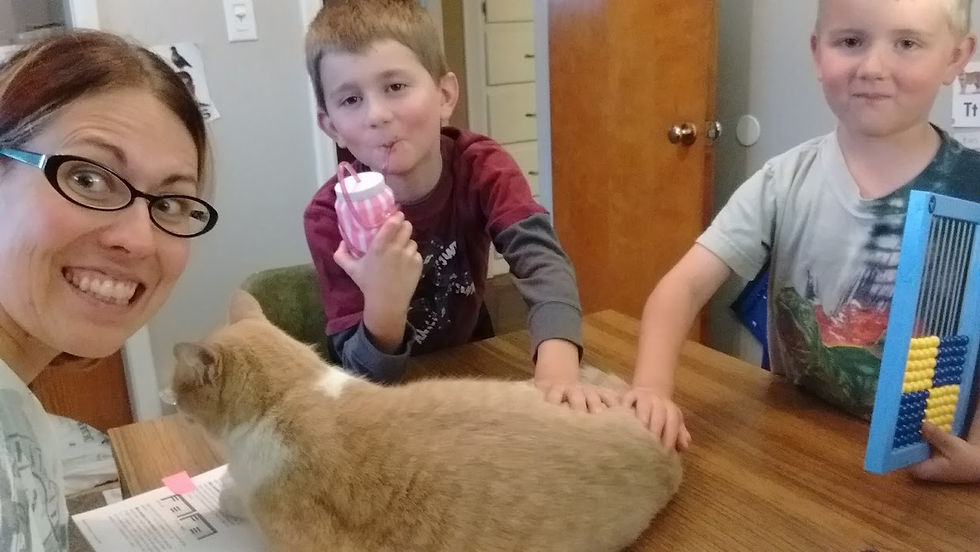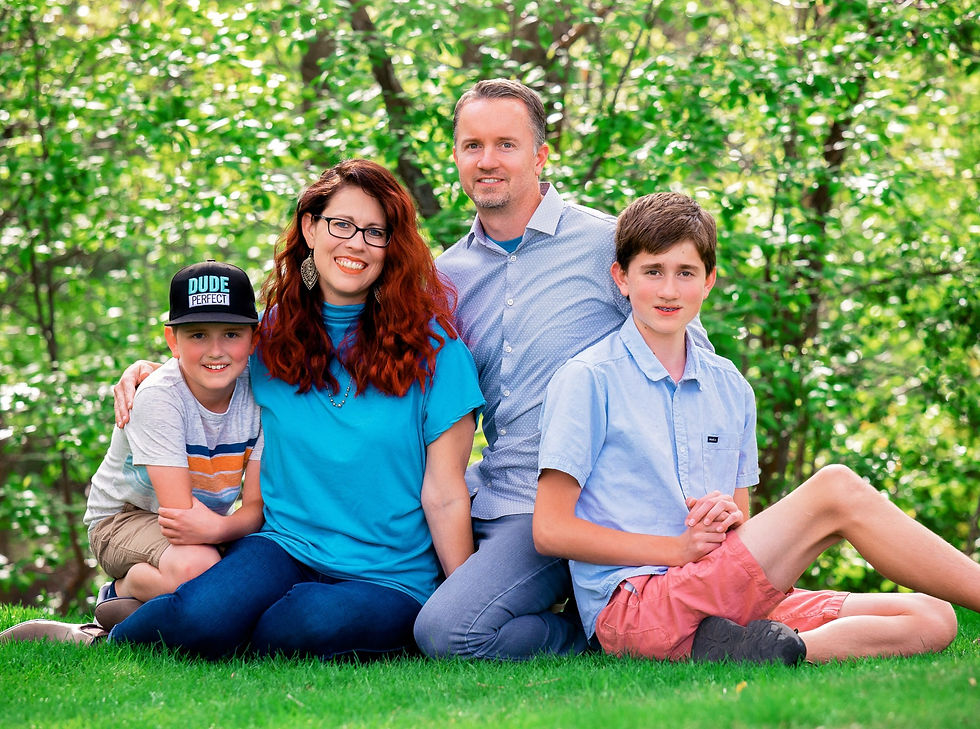Homeschooling High Needs: Keeping Your Gaze On What Serves You
- Chelsea Whitby

- Apr 14, 2023
- 7 min read
By Chelsea Whitby, HHU Contributor
Guest writers are invited for their insights into different aspects of the Homeschool Hub Utah's four pillars, which are to connect, empower, educate, and serve homeschooling families in Utah. While we feel each guest blogger's message will be helpful to homeschooling families, not all ideas presented by every guest blogger are officially endorsed by Homeschool Hub Utah.

photo credit: Lena Taranenko
In Sanskrit, there is a word: “Drishti." If you’ve ever done yoga you may have heard this word come up. It’s a specific neutral spot, somewhere in front of you, that you fix your eyes on in order to help you keep your focus. This is often done while holding a certain posture or yoga position. Ancient Yogis believed that where the eyes went the attention would follow. In my teens and 20’s, my focus was on everything all at once. I attacked life with fierce veracity. There was no soft gaze. Everything was essential; everything was non-negotiable. I focused on all the places all at once, never just one at a time. Then I had kids.

photo credit: Ketut Subiyanto
I tried to keep this intensity up for several years, long after I’d discovered the beautifully chaotic neurodiversity I’d brought into the world in the form of my two delightful children. The longer I went with this intense approach to life the more exhausted I became. Focusing on everything still seemed essential to me, but it was becoming more and more evident that “everything” was slowly killing me. Somewhere along the way I met some lovely, honest, brave people; a gifted pediatrician, an invaluable occupational therapist, and a dear friend- who saw me burning out and were willing to say something. The inevitable train wreck I was headed for was obvious to them. It took me longer to see. I think it’s a myth of youth to think we can have it all. Life is a buffet, especially for those in positions of privilege, but even though you have the widest variety of choices in front of you, you can’t necessarily consume it all. The truth is that there is only so much time, money, physical energy, emotional bandwidth, etc. When you find yourself parenting kiddos with higher needs, making intentional and healthy choices become even more important.
Focusing Your Gaze With Your Children
Recently I was speaking to a professional from whom I was seeking advice in another area of my life. She asked me, “What does success in this area of your life look like for you? Where do you hope to be in a year? Work backward from there to decide how to proceed.” I feel like this advice is solid in so many ways. When my little family first started homeschooling, emotional dysregulation was our special challenge. It was hard to get through breakfast without big feelings and even bigger upsets. I’d often find myself spending the whole day just putting out emotional fires. None of the parent strategies we learned made it any better. By the time my husband came home at the end of the day, all of us were so exhausted from the emotional exertion it took just to survive, that he was picking us up off the floor. Our lives were miserable. My husband and I decided that self-regulation and independence were the two tools we needed our children to have the most- that’s where we started. For a time period, this was our “drishti”- our focus was solely on that.

photo credit: Lena Taranenko
I began to look at the academic subjects I was teaching as tools to teach self-regulation and independence. If spelling got done- great! If not, we for sure got some good practice working independently, or verbalizing our feelings, or whatever it was we were hitting up against that particular day. But once my focus shifted to teaching these emotional skills as opposed to getting through two more spelling lessons, I always felt successful on some level. (Even if the practice to verbalize how you're feeling ends in a blinding six-year-old rage session, you still have given them exposure to the alternate options available. Those interactions add up!)
At first, I really worried about this approach because I was so aware of the responsibility I had to educate my children. If I didn’t do math today would they ever graduate from high school, get a job… move out? But our time focusing on these skills, sometimes to the exclusion of everything else, was relatively short. Once we were really honing in on their most dire needs, they began to make huge gains. It wasn’t long before we had enough time and emotional space to focus on self-regulation and all the other academic subjects we needed to. (Side note: The alternative of just trying to push through everything didn’t guarantee spelling got done either. In fact more days than not, the subjects I loved so much and wanted my kids to learn to enjoy just became a battleground; tainting love of learning with negative emotions and harsh interactions.) I’m happy to report that now, as teens, both my boys work almost entirely independent of me and (for the most part) self-regulated each day. They’ve caught up in their studies and I’ve been able to shift from private teacher to coach and mentor which has been such a confidence boost for my kids and a game changer for my mental health. I will never regret focusing my gaze on the things that best served us at that time. It was one of the key elements that changed things for my family during our years of highest need.
Focusing Your Gaze With Yourself
In addition to focusing my gaze on the needs of my children, I also learned how to focus it in on myself. Like many young families the demands we were facing at the same time as learning of our children’s challenges were crushingly overwhelming. My husband was working and going to school full-time. We were both serving in our community. Money was tight and extra time was non-existent. Our marriage was young enough to not have very many tools yet and old enough to be safely outside the honeymoon period. In addition, several chronic health issues I’d struggled with for years were coming to a head as unresolved childhood trauma surfaced. We didn’t have much support from extended family and I didn’t have many friends, especially not ones that understood my desire to homeschool. All of a sudden we started getting diagnoses that came with therapies and interventions. I was homeschooling, shuttling children to multiple appointments each week, growing more and more ill and distressed, trying to keep my marriage alive and my house clean, and my children from imploding and I was drowning.

photo credit: Gustavo Fring
I hit a wall and everything came crashing down. I remember calling all the therapists my children were seeing and canceling future appointments. I cleared our schedule of everything but the essentials and then put myself in therapy. At the time, it felt selfish and careless but I couldn’t keep doing what I had been doing. I braced for impact, but to my surprise, everything didn’t crumble. My kids kept learning; they stayed curious and happy. We listened to podcasts, read aloud, and had big juicy discussions in place of filling in worksheets and cramming in subjects. It turns out, most of the things I thought were so important really weren’t. Slowly I began to get myself the help I had needed for years. I made doctors appointments for myself and started treating symptoms that had long since become too loud to ignore. I worried a huge backslide was coming. All that work I’d put in with my kids -- the hundreds of hours of therapies, dozens of detailed visual schedules, and elaborate incentive programs I’d created -- were peeled back to their most essential and basic forms. And I, slowly, started to get better.
“What we achieve inwardly will change our outer reality.”
Miraculously, so did my children. Now I have many theories for this and I certainly am not saying that caring for yourself will take away all your children’s challenges. That would be an overly optimistic and naive view. What I am saying is that as I got myself the care and help I needed something changed in our home. The Greek author Plutarch said, “What we achieve inwardly will change our outer reality.” I have found this to be absolutely true. When I began to work on addressing my own inner needs, I found that I had more emotional and physical availability for the high needs of my children. My need to control them and their behaviors decreased as I found more control over my own mind and body and I found myself working in more intentional ways with the time and resources available to me. I realized so clearly that my kids could only ever be as healthy as their mom was. I was their guide after all. I look back now and refer to that time as “the year I quit everything." But by quitting “everything,” I began growing something. Something very specific. Something that resembles the life I wanted and have grown to love and not just the random pieces I was handed, to begin with.

Maybe what your child is needing most is math intervention, or mental health, or personal hygiene. Maybe what you are needing is more health or friends or creative outlets. There are some things that will serve you better than others to focus on as you move forward in both raising yourself and the very specific humans you’ve been entrusted with. If doing everything is feeling like it’s yielding nothing, maybe try to focus your gaze in on just a few things for a while. See what happens.
“What does success in this area of your life look like for you? Where do you hope to be in a year? Work backward from there to decide how to proceed.”

Chelsea Whitby has been working in education in one way or another for the past 20+ years. She has her Masters in Curriculum and Instruction with an emphasis in Language Literacy. When she decided to homeschool her kids almost a decade ago she discovered her love for alternative education and hasn’t looked back. She lives with her two teenage boys, her fantastically patient husband, an eternal puppy aussiedoodle, and an angry senior cat. She loves to read everything, practice meditation and yoga, imagine she’s a professional author and artist, and have deep existential conversations with anyone who will listen.




Love this! The sentence, "When my little family first started homeschooling, emotional dysregulation was our special challenge. It was hard to get through breakfast without big feelings and even bigger upsets. I’d often find myself spending the whole day just putting out emotional fires" is so real to me, this is EXACTLY how our first 6 years of homeschooling have felt. Things are [slightly] calmer now, but man, it is a full day of big emotions! Thank you for sharing your story, Chelsea, that speaks so much to my own.